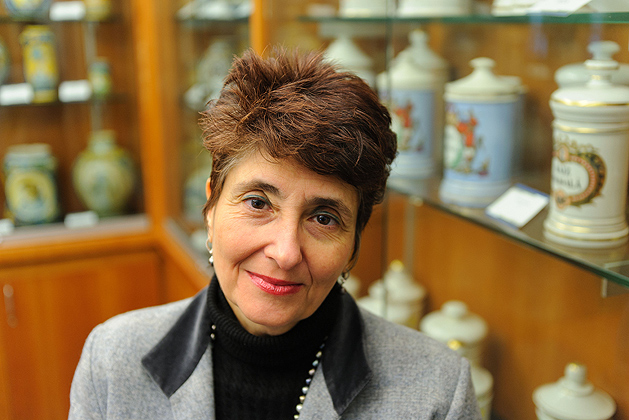
Susan Froshauer could easily use her expertise to launch a biotech company, conduct medical research, or help cutting-edge entrepreneurs find investors – and in fact, she’s already done all of those things.
Now, she’s marshaling those experiences to benefit the University of Connecticut and the state as a whole as director of a program that links UConn’s expertise with industries that need its innovations.
Froshauer, a biotech entrepreneur and former Pfizer Inc. researcher and business development leader, joined UConn this year to lead its Tech-Knowledge Portal program at the Office of Economic Development. Her arrival comes as UConn’s role in building Connecticut’s economy and creating jobs is becoming more widely recognized, and as partnerships with existing and would-be businesses are taking many innovations from the lab to the marketplace.
Froshauer, who’s helping those researchers and industries find each other, describes her work as part traffic cop, part matchmaker. It requires her to stay on top of changing industry trends, while also knowing what research is under way at UConn and might offer a natural fit in those areas.
“That part is very exciting for me because connecting people in their research endeavors and seeing those connections create enhanced value is what I like to do,” Froshauer says. “There might also be serendipitous relationships that I can help foster as a result of having those continual conversations with various companies, with investors, and with faculty members.”
Mary Holz-Clause, UConn’s vice president for economic development, says Froshauer’s extensive experience includes a variety of industries, giving her contacts and entrepreneurial expertise that cut across many business sectors.
The Tech-Knowledge Portal, funded with a U.S. Economic Development Administration grant, is part of an effort to use UConn’s expertise to promote technology-related jobs and economic growth in Connecticut.
Froshauer’s colleagues in the Office of Economic Development also work with entrepreneurs to license their innovations and assess their potential for start-up companies; to provide on-campus business incubation space and resources through the University’s Technology Incubation Program; and to link investors with promising projects and innovations.
“What we want to do at UConn is very much in line with the state’s strategy, finding out the needs of business and industry and determining how UConn can meet those needs,” Holz-Clause says.
That’s where Froshauer and her colleagues come in.
Froshauer comes to her new role with particular expertise in biotechnology as a co-founder and former president and CEO of New Haven-based Rib-X Pharmaceuticals, which is developing treatments to battle drug-resistant bacteria.
Before her Rib-X experience, Froshauer was a researcher at Pfizer before moving into business development, meeting with academic researchers and biotechnology companies to create partnerships between them and the global pharmaceutical giant.
She holds a doctorate from Harvard in molecular genetics and did post-doctoral research at Yale in cell biology. She’s also an advisor to the board of the UConn Research & Development Corp., a UConn Foundation subsidiary that works with faculty and staff to launch new businesses.
She’s also a board member at the Connecticut Angel Investor Forum, which links promising startup businesses and potential investors, a position she says has helped give her insight into the kinds of research with the potential to draw financial support.
Froshauer joined UConn in January and wasted no time using her experiences to the advantage of the school and its researchers.
She’s already working with alumni and other Connecticut business executives to build a network of mentors for budding UConn entrepreneurs, and also fields regular calls from people outside the University who want to collaborate with its experts or learn more about its Technology Incubation Program or licensing one of its technologies.
With offices on both the Storrs and the Farmington campuses, Froshauer hopes to get to know a wide range of faculty members and learn about their work. She’ll also meet regularly with officials in various industries, entrepreneurs, potential investors, and others to keep her finger on the pulse of business and technology trends.
“Being involved in the larger network of what’s going on in Connecticut and the more global business community will create value both for UConn and for the state,” she says. “I think an awareness of what UConn has to offer is growing exponentially. This is a prime moment for the state and for the University.”


